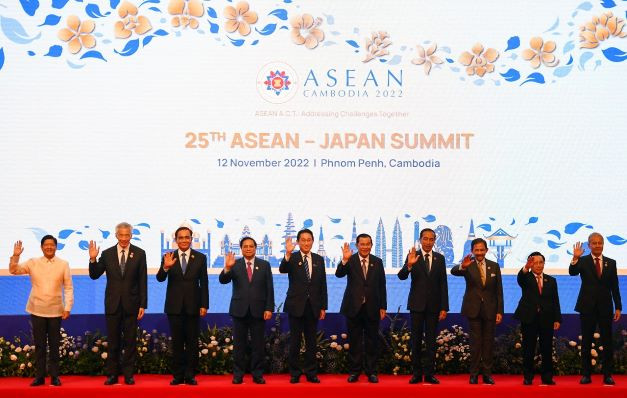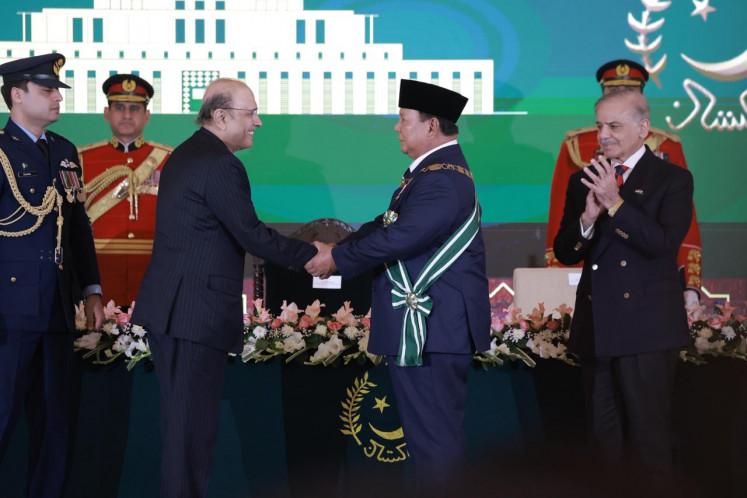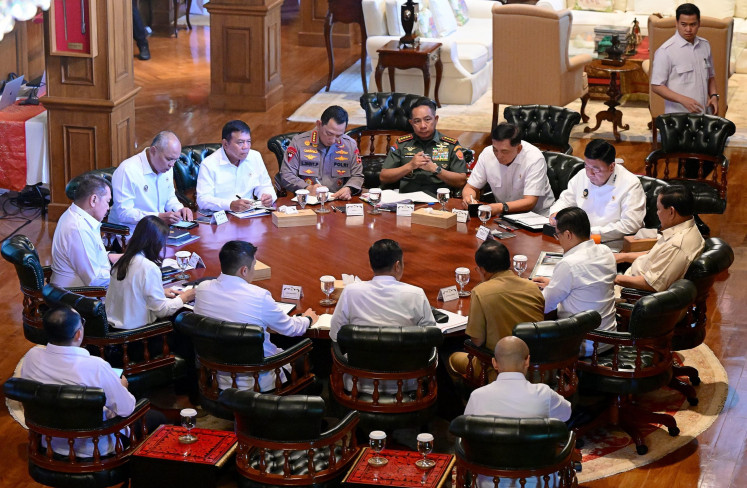Popular Reads
Top Results
Can't find what you're looking for?
View all search resultsPopular Reads
Top Results
Can't find what you're looking for?
View all search resultsAdvancing the Fukuda Doctrine afresh
As a responsible member of the international community, Japan is obliged to revise its past security strategy based on the current, extremely complex and challenging geopolitical landscape.
Change text size
Gift Premium Articles
to Anyone
 Banding together: ASEAN and Japanese leaders (from left to right) Philippine President Ferdinand Marcos Jr, Singaporean President Lee Hsien Loong, Thai Prime Minister Prayut Chan-o-cha, Vietnamese Prime Minister Pham Minh Chinh, Japanese Prime Minister Fumio Kishida, Cambodian Prime Minister Hun Sen, President Joko “Jokowi” Widodo, Brunei Sultan Hassanal Bolkiah, Laotian Prime Minister Phankham Viphavanh and Malaysian lower house speaker Azhar Azizan Harun wave on stage during the ASEAN-Japan Summit as part of the 40th and 41st ASEAN Summits in Phnom Penh on Nov. 12, 2022.
(AFP/Nhac Nguyen)
Banding together: ASEAN and Japanese leaders (from left to right) Philippine President Ferdinand Marcos Jr, Singaporean President Lee Hsien Loong, Thai Prime Minister Prayut Chan-o-cha, Vietnamese Prime Minister Pham Minh Chinh, Japanese Prime Minister Fumio Kishida, Cambodian Prime Minister Hun Sen, President Joko “Jokowi” Widodo, Brunei Sultan Hassanal Bolkiah, Laotian Prime Minister Phankham Viphavanh and Malaysian lower house speaker Azhar Azizan Harun wave on stage during the ASEAN-Japan Summit as part of the 40th and 41st ASEAN Summits in Phnom Penh on Nov. 12, 2022.
(AFP/Nhac Nguyen)
After Indonesia led the Group of 20 Summit to great success last year, the Financial Times praised the country as an “overlooked giant” and The Economist published the feature: “Why Indonesia matters”.
For some countries, the description may ring true. The world finally took notice of how much Indonesia and ASEAN matter to global peace and prosperity. But for Japan, Indonesia and ASEAN have long been most important as partners in our diplomacy and will remain so for years to come.
The relationship between Japan and Southeast Asia has gone through a series of challenges during the course of its history. However, we both have made conscientious and steadfast efforts to strengthen our partnership. On the part of Japan, successive prime ministers expressed their resolve to do so. Yet, none other than the Fukuda Doctrine, dari hati ke hati (from heart to heart) in 1977 expressed Japan's resolution more eloquently.
All three basic principles of the Fukuda Doctrine remain relevant today.
First, Japan will continue to be a nation committed to peace. You may say that Japan formulated a new national security strategy at the end of last year and will increase its defense budget and capabilities.
As a responsible member of the international community, Japan is obliged to revise its past security strategy based on the current, extremely complex and challenging geopolitical landscape. At the same time, Japan is proud that we have walked as a peace-loving nation for the past 78 years and remain determined to never deviate from this steadfast course.
It is clearly stated in the strategy: As a peace-loving nation, Japan will adhere to the basic policy of maintaining an exclusively national defense-oriented policy, not becoming a military power that poses a threat to other countries, and observing the Three Non-Nuclear Principles.
Second, Japan, as a true friend of ASEAN, will further consolidate our relationship of mutual confidence and trust based on a “heart-to-heart” understanding. There is no further explanation necessary about the importance of dari hati ke hati and Japan is silently proud of our track record on our commitment to this principle.
Third, Japan is always a partner that walks side by side with ASEAN as its equal partner in supporting its efforts to strengthen their own solidarity and resilience. Japan has acted as one of the most important partners, in the economic sphere and beyond, toward ASEAN while always respecting ASEAN centrality and unity.
This year, Japan celebrates our 50th year of friendship and cooperation with ASEAN and 65th year of diplomatic relationship with Indonesia, as Indonesia assumes ASEAN chairmanship. What lies ahead this year?
Prime Minister Fumio Kishida, in his policy speech at Johns Hopkins University this month, amply expressed his determination to strengthen ASEAN-Japan cooperation at the ASEAN-Japan Commemorative Summit in Tokyo to be held around December this year:
“Southeast Asian countries are the closest and most-crucial partners for Japan.” “I hope to demonstrate that Japan's ties with Southeast Asian countries constitute a core element of peace and prosperity in the Indo-Pacific region, even in the face of the drastically changing international community.”
It was also this month that Foreign Minister Retno LP Marsudi outlined Indonesia’s priorities for ASEAN chairmanship. She explained that, under the theme of ASEAN Matters: Epicentrum of Growth, the implementation of ASEAN Outlook on the Indo-Pacific (AOIP) would be the spirit of Indonesia's chairmanship.
In her words: “An Indo-Pacific region that is peaceful, stable, respecting international law and prioritizing inclusive cooperation is key for ASEAN to become the epicentrum of growth in the region and the world.”
Japan, as the first country that expressed its support for AOIP, will spare no effort in bolstering Indonesia’s chairmanship and initiatives. AOIP upholds important principles, including a rules-based framework, respect for sovereignty and international law and the renunciation of the threat or use of force. These principles are critical at this time of crisis, as we are witnessing deviations from those principles in the world.
This year provides an ideal opportunity for ASEAN and Japan, with Indonesia as chair, to unify our strength to make the Indo-Pacific region the center of peace, stability and prosperity, with respect for international law. Our priorities are converging with synergy effect.
For this to happen, our joint efforts need to be wide-ranging. It is fortunate that Japan has gained a distinct strength and trust through practical cooperation with ASEAN in so many sectors. Building on our achievements, ASEAN and Japan can now take joint leadership in broadening our cooperation across the Indo-Pacific region and beyond to address global challenges, including but not limited to digital transformation, decarbonization, energy and food security with resilient supply chain, connectivity with quality infrastructure, public health, disaster management, maritime cooperation and SDGs.
It is also imperative to further deepen our “heart-to-heart” understanding and mutual trust to match the ever-growing need for our cooperation. We must double down on promoting people-to-people links and cultural exchange, with the greatest possible focus on the youth, as we move away from the pandemic that hindered precious opportunities for exchanges. The youth is a source of hope for our future, and Japan aspires to develop further our relationship of “heart-to-heart”, from the heart.
The Fukuda Doctrine has an enduring value. In fact, its value has now become even greater in light of the growing importance of our common challenges and responsibilities. Let us think this out afresh and work together toward the ASEAN-Japan Commemorative Summit this year, not only for ASEAN and Japan but also for the Indo-Pacific region and the world, not only for the people living today but also for the people who will live in another half a century and beyond.
***
Kenji Kanasugi is ambassador of Japan to Indonesia. Masahiko Kiya is ambassador of Japan to ASEAN.










